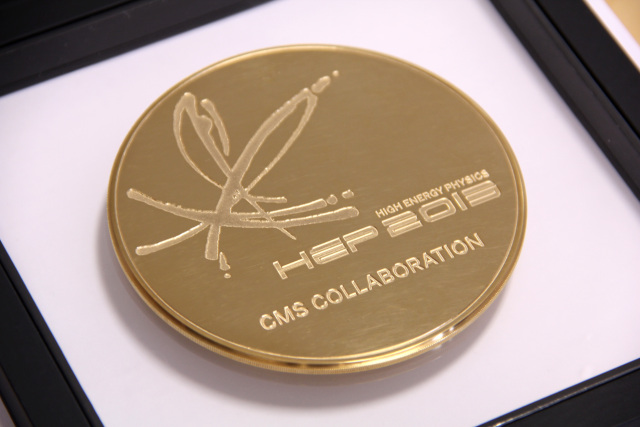
|
The 2013 High Energy and Particle Physics Prize of the European Physical Society has been awarded jointly to the ATLAS and CMS collaborations for the discovery of a new heavy particle with the properties of the long-sought Higgs boson, and to three experimental physicists, Michel Della Negra (CERN, now at Imperial College London, UK), Peter Jenni (CERN, now at Univ. of Freiburg, DE) and Tejinder Virdee (Imperial College London, UK) for their pioneering and outstanding leadership rôles in the making of the ATLAS and CMS experiments.
The IIHE (ULB-VUB) CMS team regroups today 48 researchers. The team was and is still actively participating to the challenging searches and studies of the famous scalar boson postulated nearly 50 years ago by two Belgian physicists, Robert Brout and Francois Englert from the ULB, and by P. Higgs from Edinburgh University. The EPS-HEPP 2013 price rewards the long track performed by experimental physicists to discover the scalar boson. The discovery of a new particle was announced in July 2012 at CERN by the CMS and ATLAS experiments, and the identification of the particle as indeed the Brout-Englert-Higgs scalar boson were confirmed at the Moriond conference in march 2013, thanks to the measurement of its properties.
The institute participated to the CMS experiment since its conception phase more than 20years ago. The researchers from the IIHE were heavily involved in the construction, assembly and test of part of the detector, in the physics analysis preparation and since the running of the machine, in the data taking and data analysis. IIHE physicists made important contributions in testing the Standard Model of particles physics, searching and studying the famous Brout-Englert-Higgs boson and looking for other new particles as the ones predicted by supersymmetric models, models with extra-spatial dimensions, Grand Unified Theories or even candidates for Dark Matter more info on the price : link to the press release http://eps-hepp.web.cern.ch/eps-hepp/PrizeAnnouncements/hep2013/press-release-2013-en.pdf |
The Interuniversity Institute for High Energies, IIHE (ULB-VUB), was created in 1972 at the initiative of the academic authorities of both the Université Libre de Bruxelles and Vrije Universiteit Brussel.
Its main topic of research is the physics of elementary particles. The present research programme is based on the extensive use of the high energy particle accelerators and experimental facilities at CERN (Switzerland) and DESY (Germany) as well as on non-accelerator experiments at the South Pole. The main goal of this experiments is the study of the strong, electromagnetic and weak interactions of the most elementary building blocks of matter. All these experiments are performed in the framework of large international collaborations and have led to important R&D activities and/or applications concerning particle detectors and computing and networking systems.
Research at the IIHE is mainly funded by Belgian national and regional agencies, in particular the Fonds National de la Recherche Scientifique (FNRS) en het Fonds voor Wetenschappelijk Onderzoek (FWO) and by both universities through their Research Councils.
